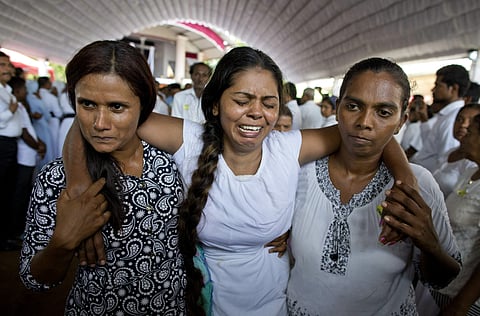Islamic State claims responsibility for Sri Lanka serial blasts as death toll rises to 321
BEIRUT: The Islamic State on Tuesday claimed responsibility for the suicide bombings targeting churches and luxury hotels in Sri Lanka as the death toll in the Easter Sunday bloodbath touched 321, including 10 Indians, with over 500 injured.
The Islamic State's claim came as the country held a mass funeral for some of the victims at a sprawling grave near the St Sebastian's Church in Negombo, around 40 km north of Colombo, where mourners struggled to hold back their tears.
An Arabic language statement on the group's official al-Amaq news agency made the claim on the encrypted messaging app, saying the suicide bombers were "fighters of the Islamic State".
"The perpetrators of the attack that targeted nationals of the crusader alliance (anti-IS US-led coalition) and Christians in Sri Lanka were Islamic State fighters," the brief message said.
Tuesday's statement came after an unconfirmed video posted to social media by an affiliated group suggested that the Islamic State was behind the Easter horror. That video showed photos of three of the alleged suicide bombers.
The men, who are described as "assailants" rather than the more common "martyrs", were named as Abul Barra, Abul Mukhtar and Abu Ubaida and featured in front of a black IS flag giving the one-finger salute, the news.com of Australia said.
Click to view our Twitter moments
Authorities have so far named a Sri Lankan Muslim group, the National Thowheed Jamath (NJT), for the bombings but said the mayhem would not have been possible minus international support.
Earlier in the day, Defence Minister Ruwan Wijewardene said the Easter attacks were a "retaliation" for last month's Christchurch mosque shooting that left 50 Muslims dead and were blamed on a white supermacist from Australia.
The Minister put the latest death toll in Sri Lanka at 321.
The Islamic State's and the Defence Minister's claim give an international dimension to the Sunday carnage that killed mostly Sri Lankans but also some 35 foreigners, including from the US and other Western countries as well as 10 Indians.
The Indian High Commission said that with the death of two more Indians, the Indian death toll had risen to 10.
Also on Tuesday, Sri Lanka observed a day of national mourning, with the national flags on public buildings flying at half mast.
The mourning started at 8.45 a.m. to coincide with the start of the deadly attacks on Easter worshipers at churches and guests at hotels in three Sri Lankan cities.
Three minutes of silence were observed across Sri Lanka to honour the dead.
The police have detained 40 suspects in connection with the attacks. Reports said they include a Syrian who was caught after the interrogation of local suspects.
The government has suggested that seven suicide bombers were involved in the bombings.
A CCTV video showed one of them, a young man wearing a sky blue shirt and jeans and carrying a backpack, casually walking into an Easter congregation in a church where he blew himself up.
The series of attacks on Sunday began with six nearly simultaneous explosions targeting three luxury hotels in Colombo and three churches - one in Colombo, another in Negombo and the third in the Tamil-majority Batticaloa town in the island's east.
Hours later, a seventh blast took place in a small hotel near the Colombo zoo killing two persons.
The last of the bombings occurred when police raided a residential complex in Dematagoda, a neighbourhood in Colombo, but a terrorist detonated himself killing three policemen and also the wife and sister of one of the suicide bombers.
Sunday was the deadliest day in the country since the end of a civil war between Tamil Tigers and government forces that began in 1983 and ended in 2009.
Meanwhile, police in Colombo issued an alert that a van or truck carrying explosives may be in Colombo following which security was stepped up at government buildings and police stations.

